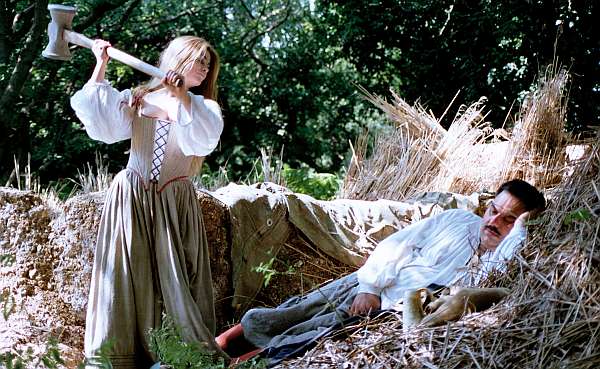 ★★★½
★★★½
“Hammer time!”
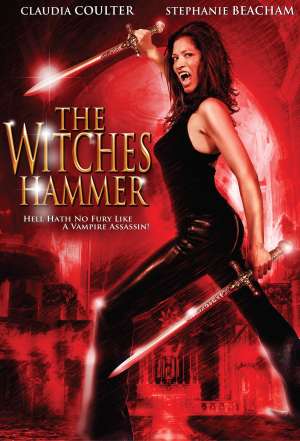 If never quite escaping its low-budget roots, or producing enough compensations or fresh imagination to make you forgive them, this is a robust enough vehicle and a decent entry in a sadly-small sub-genre: British girls-with-guns. It’s perhaps closest to the 1998 movie, Razor Blade Smile – which I really should get round to covering here, except it was pretty freakin’ awful. Similarly, Hammer involves a vampire assassin, though you can also lob in a shedload of other influences, conscious or otherwise, from Buffy, through Nikita to Bloody Mallory. If originality is not the movie’s strong suit, it is at least stealing from some of the best action heroines.
If never quite escaping its low-budget roots, or producing enough compensations or fresh imagination to make you forgive them, this is a robust enough vehicle and a decent entry in a sadly-small sub-genre: British girls-with-guns. It’s perhaps closest to the 1998 movie, Razor Blade Smile – which I really should get round to covering here, except it was pretty freakin’ awful. Similarly, Hammer involves a vampire assassin, though you can also lob in a shedload of other influences, conscious or otherwise, from Buffy, through Nikita to Bloody Mallory. If originality is not the movie’s strong suit, it is at least stealing from some of the best action heroines.
Rebecca (Coulter) is resurrected from the dead by a secret (government?) program, Project 571. They turn her into a vampire, giving her enhanced speed, reflexes, strength, agility, etc. – with the downside that she’s explode into flames if she goes out in daylight. After one assignment, she discovers her handlers have been killed, but is contact by Madeline (Beacham), who runs the imaginatively-named Project 572. Together with sidekick Edward (Sidgwick), she is sent to retrieve a mystical tome a the necessary first-step to slay the head vampire, Hugo (Dover), who… Ok, I’m somewhat hazy on the specifics, but he’s the bad guy, alright? Rebecca has to martially-art her way through an ever more dangerous series of witches, vampires and self-replicating ninjas (I assure you, it’ll make sense when you see the movie, to the point where you’ll probably go, “Oh! Self-replicating ninjas! That’s what Jim meant…”) until the final encounter with what a certain action heroine would certainly call The Big Bad.
Pluses? It’s actually shot on 35mm – while HD video has become the staple of low-budget cinema, it still doesn’t have quite the same feel as film, and the atmosphere here benefits as a result. Stephanie Beacham is magnificent, possessing a calm assurance that is marvellous to watch: she breezes through her scenes like a galleon at full sail, befitting her status as a genre icon. And the little and large duo of vampire, Oscar and Charlotte, are entirely endearing – their moments of comic relief work very nicely. [The idea of a midget vampire has been used before, as anyone who saw the truly appalling Ankle Biters will know.] The digital effects are nicely done too, with the vampires collapsing into a shower of glowing sparks, in a way that would also gladden the heart of Sunnydale’s favourite slayer.
 Minuses? There’s a certain unevenness of tone which doesn’t quite work. At various moments, the film wants to be exciting, poignant, self-aware, slapsticky and dramatic: these individual moments work with varying degrees of success, and the combination, with the frequent gear-changes which result, occasionally seem clunky. Camp also needs to be played completely straight to work, and that isn’t always the case here. Hayes is over-fond of flashbacks: there are at least four here, and that’s probably three more than are necessary, with the only truly significant back-story belonging to Kitanya, the Russian witch who supposedly wrote the Malleus Maleficarum, the magic book which everyone seeks. As noted above, Eaves doesn’t really bring much new to the show: if you can find a review that doesn’t mention, say, Blade, your Google-fu is stronger than mine, and it is a very obvious comparison.
Minuses? There’s a certain unevenness of tone which doesn’t quite work. At various moments, the film wants to be exciting, poignant, self-aware, slapsticky and dramatic: these individual moments work with varying degrees of success, and the combination, with the frequent gear-changes which result, occasionally seem clunky. Camp also needs to be played completely straight to work, and that isn’t always the case here. Hayes is over-fond of flashbacks: there are at least four here, and that’s probably three more than are necessary, with the only truly significant back-story belonging to Kitanya, the Russian witch who supposedly wrote the Malleus Maleficarum, the magic book which everyone seeks. As noted above, Eaves doesn’t really bring much new to the show: if you can find a review that doesn’t mention, say, Blade, your Google-fu is stronger than mine, and it is a very obvious comparison.
Coulter is acceptable in the central role – she reminded me most of Yancy Butler from Witchblade. She just doesn’t have quite the right attitude for a supposedly ruthless killer: Olivia Bonamy, in Bloody Mallory, brought the appropriate level in such things, such as her gloves with FUCK EVIL on them. Coulter is a shrinking wallflower in comparison, and this is shown in a sequence where she’s rescued from a morgue by one of her Project 571 colleagues. Rebecca clings on to the sheet with an obvious death-grip, rather than showing any skin, almost keeping it up to her neck. Hard to imagine a stone-cold assassin caring too much about nudity in front of another woman, and a less coy approach would perhaps be more appropriate.
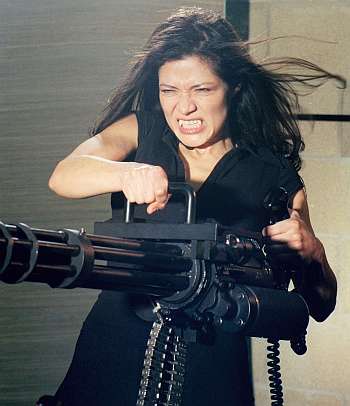 The action is solid, if generally short of spectacular. There doesn’t seem to be much doubling of Coulter – or if there is, it’s not obvious. She get to use a selection of weapons, which adds a nice sense of variety; from swords through staffs to the F-sized rail-gun pictured top left (even if the cartridges being ejected were rather too obviously digital), Kris Tanaka was the action choreographer, and also appeared as one of the vampires near the end; it’s clear he knows his stuff. I’m not quite so sure Eaves does, as the editing of the sequences – for which he is also responsible – seems to be choppy and occasionally difficult to follow, though not to the level of MTV-style editing, the bane of my life as a viewer.
The action is solid, if generally short of spectacular. There doesn’t seem to be much doubling of Coulter – or if there is, it’s not obvious. She get to use a selection of weapons, which adds a nice sense of variety; from swords through staffs to the F-sized rail-gun pictured top left (even if the cartridges being ejected were rather too obviously digital), Kris Tanaka was the action choreographer, and also appeared as one of the vampires near the end; it’s clear he knows his stuff. I’m not quite so sure Eaves does, as the editing of the sequences – for which he is also responsible – seems to be choppy and occasionally difficult to follow, though not to the level of MTV-style editing, the bane of my life as a viewer.
This was probably better than I expected it to be. The low-budget is not often obvious, and there are enough moments of charm to tide you over the less successful elements and make up for a certain lack of genuine freshness. Finally, despite the director’s protestations to the contrary, I’m still fairly sure there’s an apostrope missing from the title, which would only be grammatically correct in a context such as “The witches hammer at the door.” Eaves claims the apostrophe-less version is an accurate translation of Malleus Maleficarum, let’s just say, Wikipedia begs to differ. It probably doesn’t matter as much as I find it does, but while we can expect apostrophically-chalenged titles from Hollywood (I’m looking at you, Two Weeks Notice), good grammar costs nothing. ;-)
Dir: James Eaves
Star: Claudia Coulter, Jon Sidgwick, Stephanie Beacham, Tom Dover





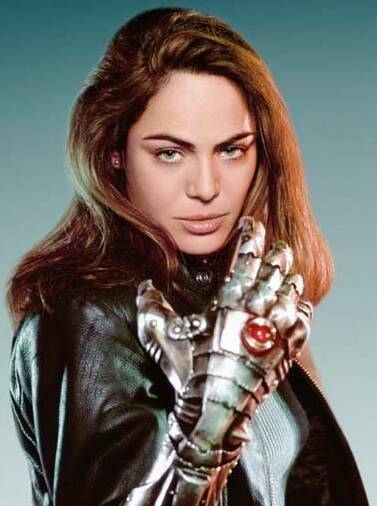 Much as in the first season, the second series of Witchblade brushed against greatness. Unlike the first, where you can point at the final episode as the key weakness, this time round it is a chronic rather than acute malaise that prevents it from getting the seal of approval. When it was great, it was fabulous – it just seemed that for every full, satisfying episode, there was a lame clunker to compensate. Particularly at the start of the season, there seemed to be precious little imagination on view.
Much as in the first season, the second series of Witchblade brushed against greatness. Unlike the first, where you can point at the final episode as the key weakness, this time round it is a chronic rather than acute malaise that prevents it from getting the seal of approval. When it was great, it was fabulous – it just seemed that for every full, satisfying episode, there was a lame clunker to compensate. Particularly at the start of the season, there seemed to be precious little imagination on view.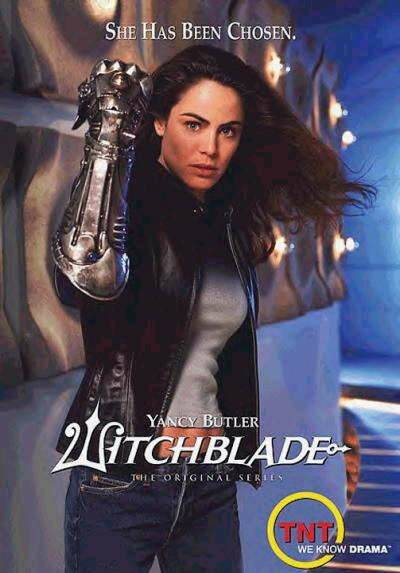 The finale, Ubique, also has to rate highly, for sheer perversity at the very least – Nottingham reaches new levels of creepiness in his final scenes with Lucrezia. Throw in a kicking soundtrack (Lords of Acid!), some spectacular deaths, and we’ll forgive a central plot device teetering curiously close to the main premise of feardotcom, which opened in cinemas the very same week. Among the interesting themes on view are the way both Pezzini and Nottingham both struggle to come to terms with the loss of their fathers, albeit temporarily in the latter’s case. This may be linked to one of the unresolved issues carried forward; who is the guy with wavy grey hair who always seems to be lurking round Sara? Indeed, the whole Nottingham/Pezzini relationship had perhaps more depth than any other in the show; veering between love, hate and obsession, with never a dull moment.
The finale, Ubique, also has to rate highly, for sheer perversity at the very least – Nottingham reaches new levels of creepiness in his final scenes with Lucrezia. Throw in a kicking soundtrack (Lords of Acid!), some spectacular deaths, and we’ll forgive a central plot device teetering curiously close to the main premise of feardotcom, which opened in cinemas the very same week. Among the interesting themes on view are the way both Pezzini and Nottingham both struggle to come to terms with the loss of their fathers, albeit temporarily in the latter’s case. This may be linked to one of the unresolved issues carried forward; who is the guy with wavy grey hair who always seems to be lurking round Sara? Indeed, the whole Nottingham/Pezzini relationship had perhaps more depth than any other in the show; veering between love, hate and obsession, with never a dull moment.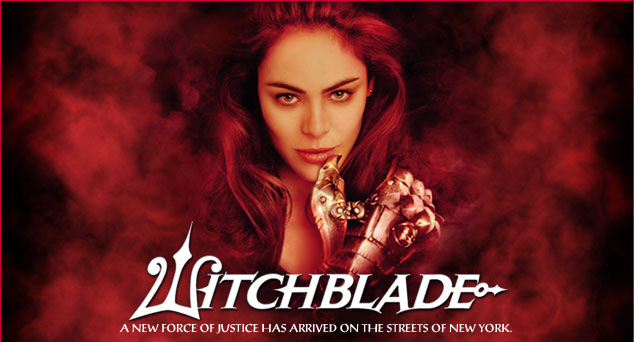 ★★★½
★★★½ Put simply, having killed of most of the cast (a refreshing change from more cowardly shows, which refuse to let
Put simply, having killed of most of the cast (a refreshing change from more cowardly shows, which refuse to let 